How to Start Your Own Branded Podcast and Why
by Cydney Hatch • December 19, 2018
It seems like every week you hear a friend or family member mentioning a podcast they cannot get enough of! From Dirty John and Serial to Song Salad and The Bounce Back Podcast, podcasts are all the rage!

There’s never been a better time to start a podcast as they are gripping audiences everywhere, they are easy to produce and there are tons of business opportunities to be had in their production! Podcasts are a great way to build a genuine connection with your audience, so, if you’re considering starting a podcast, wondering what goes into podcasting, or just curious about how podcasting can help your business this is the article for you.
If you follow this guide, you’ll be ready to launch your own podcast and take advantage of this exciting new marketing medium.
Why Should You Podcast
According to Edison Research, the number of Americans who listen to a podcast each week has grown 100% over the past four years. In fact, 67 million Americans listen to a podcast every month.
With numbers like that, it is hard to ignore the benefits podcasts can bring to your business.
From a business perspective, there are a ton of benefits to podcasts: you can deliver content quickly, extend your brand beyond written content and establish credibility by teaching a mass of people at once.

Let’s take a look at a few more more specific reasons why you should consider creating a business podcast.
Podcasts Create Personal Connection and Education
Podcasts have become a place where listeners go to learn. For industry leaders, podcasts offer a unique experience to provide valuable information to their target audience.
As podcasts are a conversation, content is communicated directly to the listener. Sharing information this way is a more personable and intimate way to share information than reading it from an e-mail or document. Podcasts create a new experience your audience can interact and learn from all while feeling more connected with your brand.
To put it simply, podcasts make brands tangible.
Podcasts are Convenient
From TIVO, Amazon Prime to even Netflix, people love consuming content at their own pace. Podcasts fit in perfectly with this trend because they allow people to consume podcast content when they please, which will add a competitive advantage to your business.
Followers can also subscribe to podcasts and have new podcast episodes download directly onto their computers, further increasing the convenience of the podcasting experience. Once a podcast resides on your computer, if your computer is portable, you can take the podcast with you and listen whenever or wherever you want.
Podcasts are Cheap
Podcasts are delivered digitally, so a perk is they eliminate many costs associated with other forms of marketing, especially print.
Increased Traffic Generation
Podcasts can help in building familiarity with a wide range of audiences. Listeners usually subscribe to the series and regularly listen. After all, who wants to stop halfway through a series?
As long as the audio series continues, they will most likely keep listening! If they like what they hear, they might also increase your traffic through word of mouth. This can quickly lead to increased traffic!
Podcasts are a Strong Social Strategy
Your podcast subscribers can be a big part of your business community and eventually, they can be some of your best prospects for deepening the relationship through cross-selling and loyalty programs.
If these reasons have convinced you enough to dabble or entertain the idea of business or brand podcasting, it’s time to start planning your business podcast! Let’s take a look at some of the things you need to consider in the next section.
Planning Your Podcast: Everything You Need to Know
There are a lot of logistics that go into podcasting and the creative process behind it. Before you dive in and start recording, it’s important to think about these questions:
- What is the goal of your podcast? Is it to generate leads? To be recognized as a thought-leader?
- What is your podcast about? What is the market research that will help you be different than others that have already been done?
- What’s the best format for a podcast? Interviews? Scripted stories? Single host? Recaps?
Unfortunately, for someone new to podcasting, you might not know where to start. If you are a podcast listener yourself, think about your experience and what you liked and didn’t like about the podcast you listened to. Your listening experience can help you share and consider the following:
- How many episodes per week? When will you go live?
- How long will episodes be?
- What category do you want to be classified under in iTunes?
- What is your show called? (Keep in mind: Apple Podcasts uses the title, author, and description fields for search. The metadata for your podcast, along with your podcast artwork, is your product packaging and can affect whether your podcast shows up in relevant searches and how likely users are to subscribe to it.)
- Who is your ideal guest?
- Who is your ideal listener?
- Will they be solo shows or guest shows?
- What topics will you cover?
- When will you write the script?
- Will you have advertisers or promote anything?
- What equipment will you need?
It’s safe to say that podcasting takes a lot more time than you expect (especially when you are first getting started!). Between planning, coordinating guests, writing scripts and show notes, podcasting takes a lot of time and effort—make sure you have a clear game plan so you can begin to develop your workflow!
What’s the Best Podcast Equipment?
First things first, you do not need a professional studio to create quality content for your listeners! All you just need a decent mic and a quiet room!

The problem is, picking the best podcasting setup can get confusing, especially if you don’t have a background in audio recording. To make it easy, let’s take a look at a few options that can help you find the right setup for your budget:
Headsets
- Audio-Technica ATH-M20X Headset (About $50 from Amazon)
- Audio-Technica ATH-M30X Pro Studio Headset (Around $70 from Amazon)
Microphone
- Audio-Technica ATR2100-USB Cardioid Dynamic USB/XLR Microphone (About $64 from Amazon)
- On Stage Foam-Type Mic Windscreen (About $3 from Amazon)
- Blue Microphones Yeti USB Condenser Desktop Computer Microphone (About $129 at Best Buy)
Pop Filter
- Microphone Pop Filter For Blue Yeti and Any Other Microphone Dual Layered Wind Pop Screen With Flexible 360° Gooseneck Clip Stabilizing Arm (About $8 from Amazon)
- Foam Windscreen for Blue Yeti – Can Also Cover Other Large Microphones such as MXL, Audio Technica and more – Made from a Quality Sponge Material to Act as a Pop Filter for your Mic (About $12 on Amazon)
Once you’ve recorded your podcast, you’re going to want to make some edits and adjustments to get the best sound quality possible. The great news is that podcast editing software is surprisingly affordable. Here are some to consider:
- Audacity – (Free – Mac, Windows, & Linux)
- GarageBand (Free – Mac & iOS)
- Hindenburg (About $95 for Mac and Windows)
How to Export and Publish Your Podcast
Once you have finished recording your episode you’ll want to export and optimize your audio file. The best format to export episodes is typically mp3s to ensure compatibility with the most podcast apps. You’ll want to set the bit rate to 64 kbps mono for spoken word podcasts and 128 kbps stereo for podcasts that feature music.
Now that you have your final audio file, it’s time to get your podcast online. You’re going to need to find a reliable place to host your podcast and a way to generate an RSS Feed.
Things you will want to consider are:
- Bandwidth
- RSS feed
- Embed players
- Social sharing tools
By ensuring you have enough bandwidth and technology for a seamless podcast, you will save yourself a lot of headaches and will be able to produce more content at a quicker rate.
Your Podcast Launch: Things to Know
When you’re going to launch a podcast, like any business launch, you want to have a game plan. To make your podcast beginnings successful you will want to consider doing the following:
- Start sharing information about your podcast three weeks before its launch date
- Hint to your audience on what to expect
- Poll your target audience on topics they would want you to discuss
- Have 4-5 episodes ready when you launch so that your audience can get engaged
- Have a strategy on distribution (email marketing, Facebook, Instagram, Facebook ads)
By ensuring you have these basics in order, you can successfully launch an effective podcast your listeners will enjoy. To learn more about business launches, be sure to read my article here.
Making Your Podcast Successful: Tips for Growth
Now that you’ve laid the foundation, let’s move forward on ways you can grow your podcast and keep it running.
Create a Niche
If you have a business, the logical choice might be to talk about that on your podcast but you’re going to have to narrow your topics down to really stand out. For example, if you are a divorce and family lawyer that wants to better inform divorcees on topics you could address the following in episodes:
- Horror stories of legal divorces gone wrong
- FAQ of listeners questions
- Child Custody 101
- How to Handle Stock Options During Divorce
- Lawyer or Mediator? What Do I Need?
- How to Pick a Divorce Lawyer if You Don’t Know Anyone
When brainstorming topics, think about creating value and addressing the needs of your business niche and target audience.
Test Yourself and Create a Podcast Personality
Be a student of your own show, listen and seek to improve for future episodes!
Do you sound excited? Engaging? Are you asking the right questions? Are you interrupting your guest? Do you say a lot of “UMMS?”

Be kindly critical of yourself as you listen to your episodes and look for ways in which you can change your podcast personality, the mood you set, and the social habits you create. If you have room for improvement, breathe and know no one has taught you how to be a host so look for social cues of others that you enjoy listening to and make it your own! Learn from others and yourself!
By allowing yourself to be critiqued you can only get better!
Make Some Podcast Friends
Networking and making friends has never hurt, so do the same with your podcast community!
Getting hooked up with other podcasters means that you have people to bounce ideas off of and you can cross promote each other when it seems appropriate! When you network within your niche there will be some overlap when it comes to your audiences so why not make use of that?!
For example, if your podcast is about cooking, chances are great that your podcast is not the only one that your audience listens to. By collaborating with your podcast friends who also have cooking podcasts, being guests on each other’s shows and recommending specific episodes to your respective audience, both of you will benefit from an increase in listeners.
Now think, if you do that with more people, you got yourself a nice set of promoters and new listeners!
Include Notes and Background Information on Your Podcast Episodes
Audio quality is important, but the fact that people come to listen to you doesn’t mean that what you write doesn’t matter. It’s important to have something available for people who want more information.
For example, our CEO, Jacob Baadsgaard, who frequently interviews on podcasts, has information shared on podcast episode pages like Hack the Entrepreneur below:
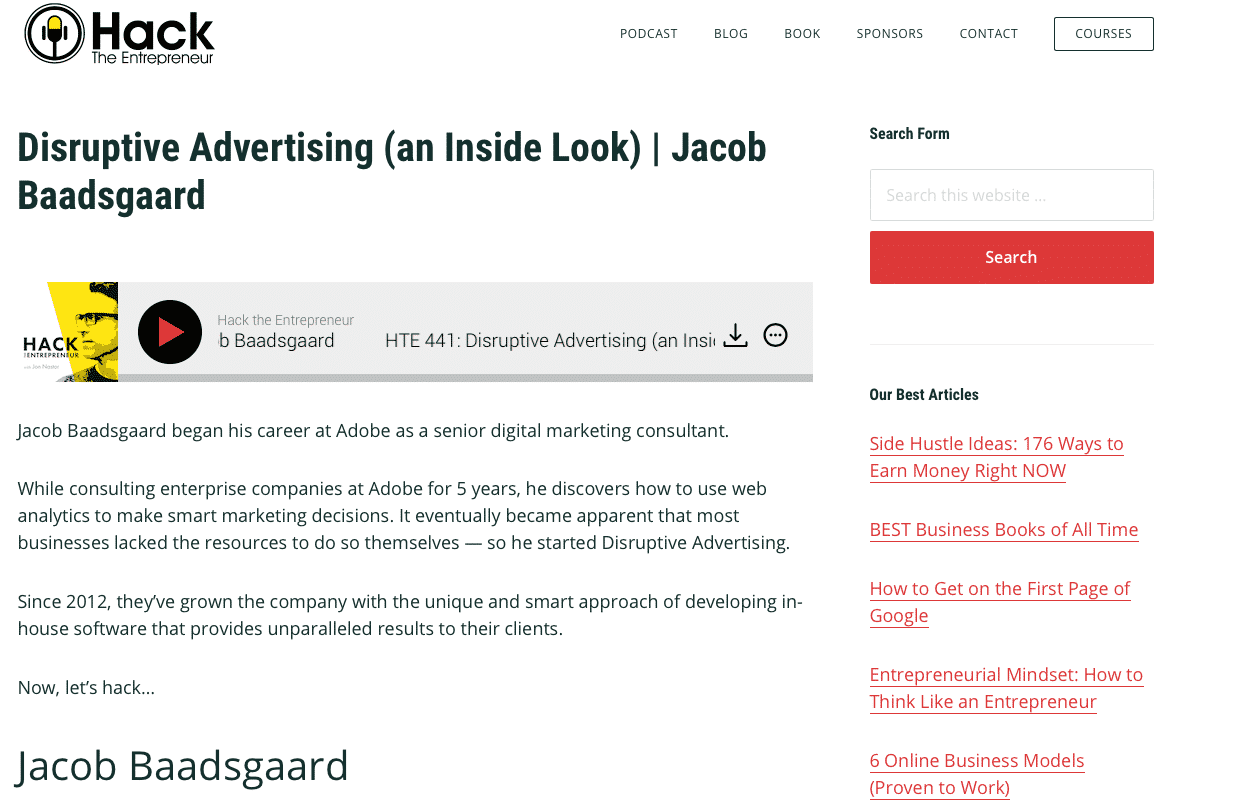
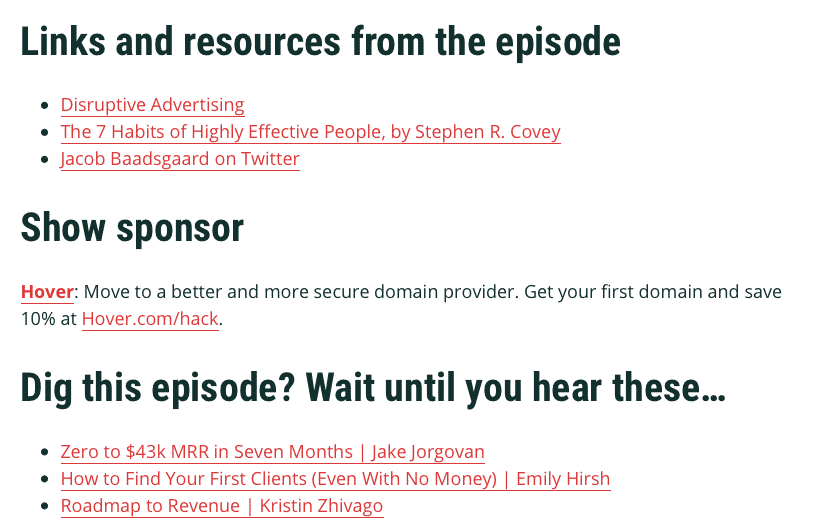
As shown this example, you should try to include:
- Episode descriptions
- Social links
- Call to actions
- Recommended readings
- Guest bios and links
- Podcast episode highlights
- Show notes with time-stamps
- Talking points
At a bare minimum, you’ll need an episode description. However, including show notes, particularly those that are time-stamped, is a great way to keep listeners engaged. It also allows them to advance ahead to the topics they really wanted to hear about.
Create Calls to Action
Once people listen to your show, what do you want them to do?
- Should they subscribe?
- Contact you for help that you can provide?
- Go to your website?
- Buy your book?
- Follow you on social media?
- Come back to hear part two of this episode series?
By including strong calls to action in both your written and audio content, you give your listeners instructions on what you want them to do. Podcasts are not just about easy-listening and creating something to just fill up your content calendar, they should be valuable, informative and actionable pieces that encourage potential customers to act.
Help your listeners take the next step! Be clear and do not be afraid to ask them to take action!
Engage With Your Listeners
Just like you do with your social media followers, make sure that you’re engaging with anyone who is leaving comments on your podcast episodes!
Answer questions, ask follow up questions and engage with people who care about your content. Engaging this way not only shows that you care about the people you listen to, it also gives you great insights into topics you can cover in future episodes!

My only request: Don’t engage with trolls as they are not worth your time and they might hurt the image of your brand. Delete them and move on!
Maximize that SEO
Making your show easy to find on the internet is key for any business component.
To help your podcast be found, just like your website and other business brand features you need to use the right keywords, titles, descriptions and content.
You want to be close to the top of Google searches and iTunes’s ‘New and Noteworthy’ section. That way, you will see more success the more traffic you get: it’s a no brainer! The key is to optimize your podcast for both for typical Google searches and for the search engines of podcast directories by including target keywords in your podcast name and description but also your episode’s descriptors.
Get Podcast Lovers Interested
96% of the most dedicated podcast fans recommend content to their friends and consume twice the content of the average listener. On average, they listen to about 13 podcasts per week and are generally “podcast loyalists”–subscribing rather than downloading individual episodes.
Since these people are highly engaged and interested in podcasts, how do you wrangle them into your show?
Some of the ways you can gain the eyes of podcast lovers are:
- Easy subscriptions
- Easy access to content
- Include sharable social buttons
- Offer in-depth content to supplement your podcast episodes like blog posts
- Offer lots of content so they can dig in and get engaged
You want the eyes of people who are highly engaged in the podcast space so offering them unique, in-depth and personable information is helpful to the growth and success of your podcast.
Effectively Use Social Media
Podcasting requires a lot of time and commitment to produce and publish, but don’t forget to spend just as much time promoting your episodes on social media!
A lot of the time, podcast listeners are also social media users, so it’s always a good idea to promote and share content in places they can connect with you, even if it’s just a reminder about a new podcast episode! Use social media to spread the word about your podcast and I do not mean just posting or tweeting about new episodes! Be creative!
Record a sneak peek of the episode with your guest on Facebook Live or get your guest to talk about their background and invite listeners to the episode. You can also dabble with video marketing and add video from your podcast session onto a YouTube channel and share it on your social platforms.
As a bonus, another great way to grow your podcast is having guests share their episode of your show on their social media channels. By doing that, it invites their followers to become fans of your show and organically grow your reach! Win, win!
Try out as many different platforms in various different forms to find those new listeners and draw them in by trying new things!
Create Quality Visuals
The perceived value and the trustworthiness of your brand is often judged on the quality of your visual content.
That means having:
- High-quality, beautiful photography
- Strong logo and branding
- Customized and defined color palettes
- User-friendly interface tools
- Integrated social media buttons and applications
- Simple navigation
- Clear page categories
For example, the podcast Song Exploder has stunning visuals that are strongly branded across their social media platforms featuring their customized podcast episode artwork, their branded logo and stylization:
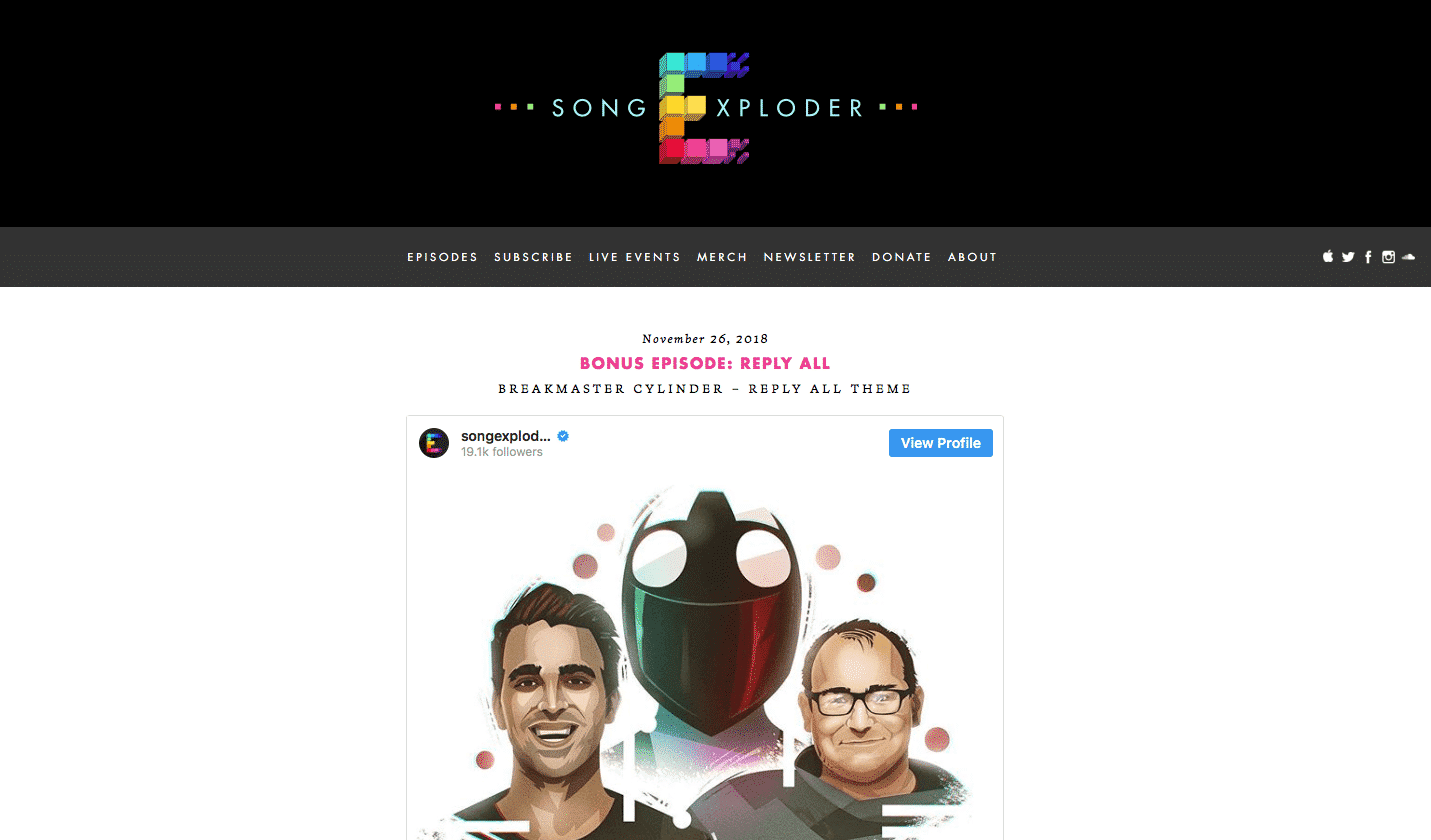
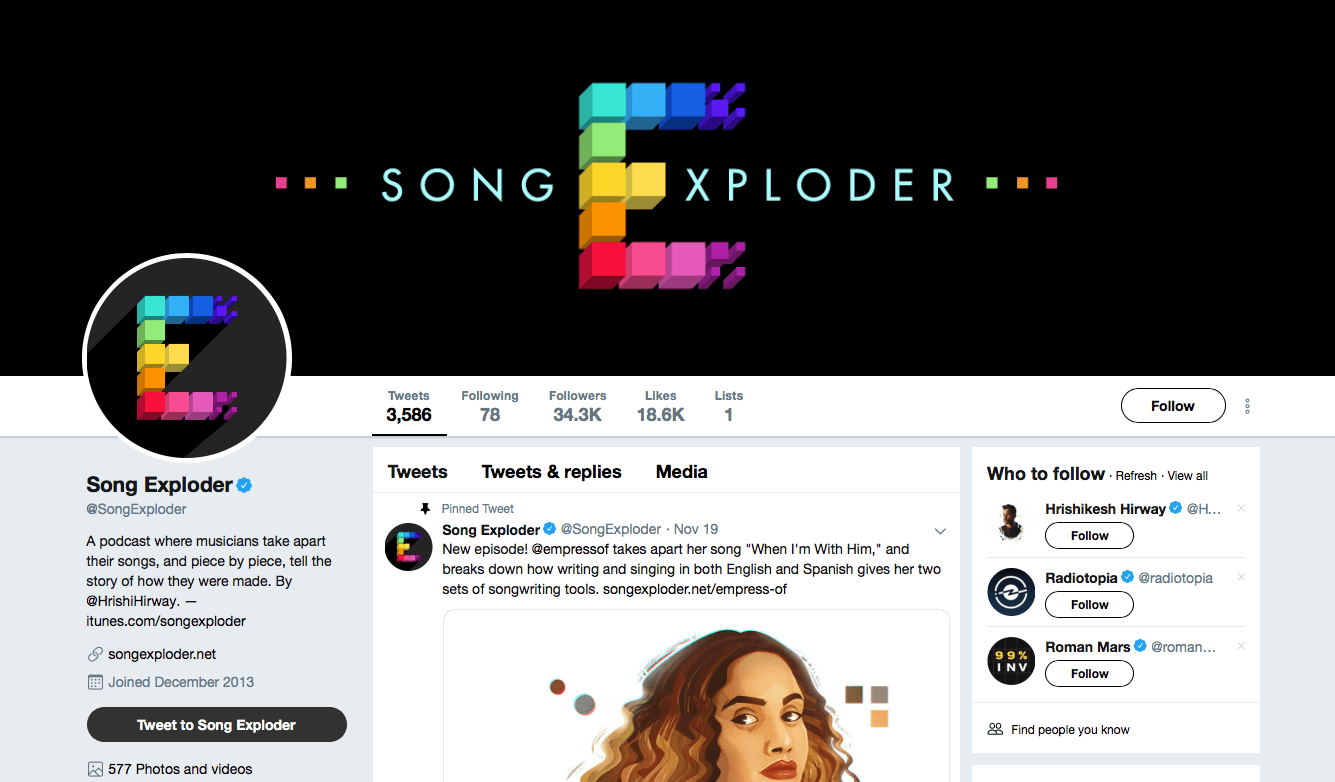
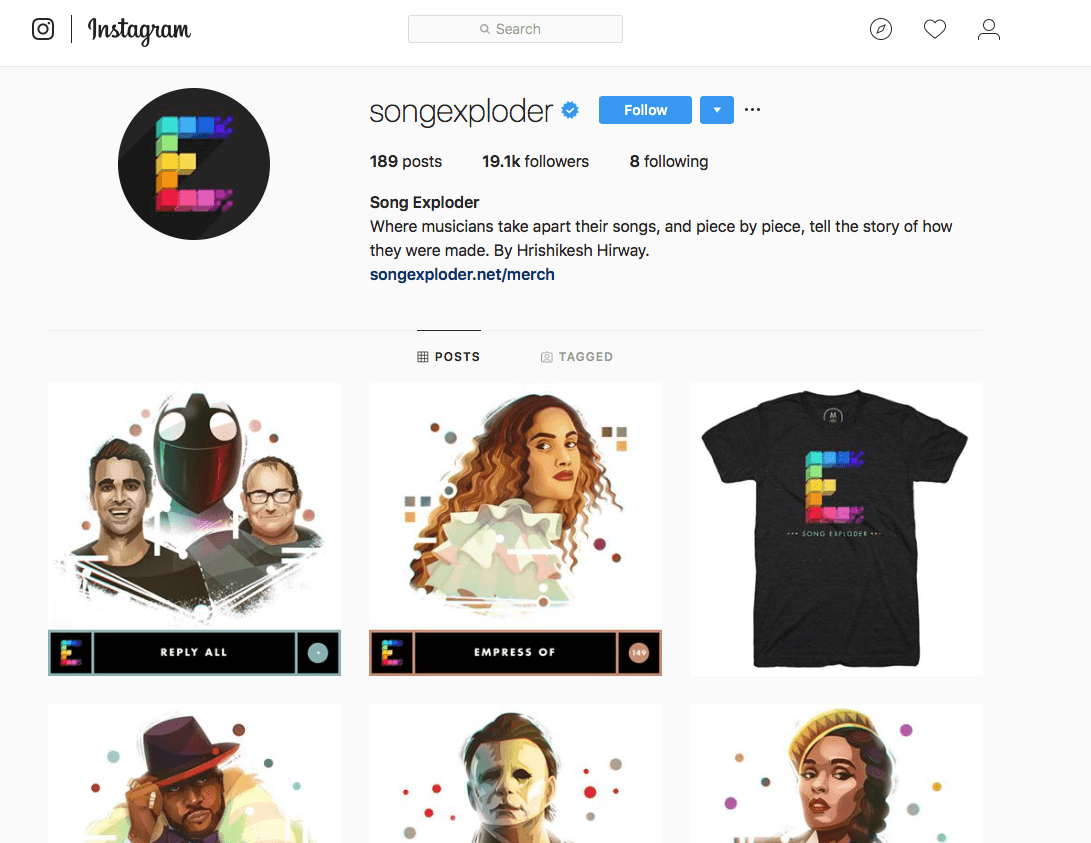
Like their example, good design and visual experience can really help your podcast retain listeners. If you question that, read some of these statistics:
- “38% of people will leave a website if they find the layout unattractive or difficult to navigate”
- “Given 15 minutes to consume content, two-thirds of people would rather read something beautifully designed than something plain”
Want to avoid driving away potential customers? Work on design, because it is more than just a “pretty website,” it is your business brand experience. It does matter.
Let’s Get Recording: Start Your Podcast
Podcasting is a growing marketing medium that makes it easy to reach your audience. While it’s growing super quickly, there is still a ton of opportunity to be had if you plan, customized and put efforts into your branding, messaging and networking.
So, with the above tools, you are ready to become a podcaster with confidence! It’s time for your voice to be heard!
What do you love about podcasting? Do you have a favorite show and what do you think they do well? Comment and share your favorites below, I would love to hear em!





